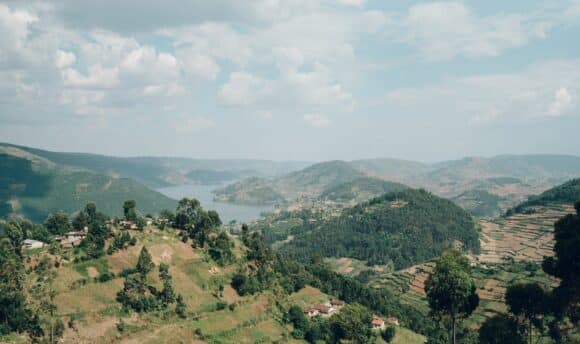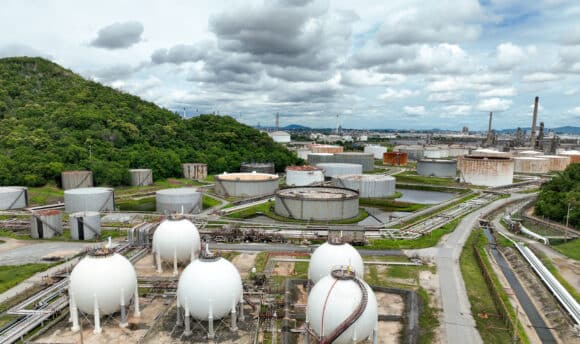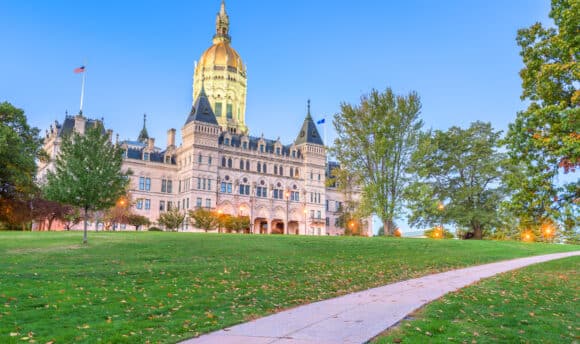Groups Deliver Petition Signed by More Than 50,000 Calling on Insurance Giant to Publicly State Position on Project
NEW YORK — Outside of American International Group Inc.’s (AIG) headquarters, activists from Public Citizen, Climate Families NYC, Sunrise Movement NYC, and other groups called on the insurance giant to publicly commit not to provide coverage for the East African Crude Oil Pipeline (EACOP). As part of the action, the groups delivered over 50,000 petitions collected by Ekō, Public Citizen, and Rainforest Action Network to AIG’s CEO Peter Zaffino calling on the insurance company to join the 20 banks and 22 insurers that have already committed not to insure the project.
“Nearly a third of the pipeline would run through the basin of Africa’s largest lake, Lake Victoria,” the petition reads. “Just one spill or leak could poison the water that 40 million people depend on for food, farming and their livelihoods.”
Intended to transport crude oil from Uganda’s oil fields to the Tanzanian coast, EACOP, upon its completion, would be the longest heated crude oil pipeline in the world. The project would cross an active earthquake zone and numerous lakes, rivers, and wetlands. Should a spill occur, the disaster could threaten vital freshwater resources.
“Human rights and climate activists in East Africa and around the world are urging AIG to not underwrite EACOP. As a massive oil and gas insurer, the onus is on AIG to publicly rule out involvement with EACOP. AIG should listen to communities and stop backing oil and gas expansion projects.”
As part of the action outside of AIG’s headquarters, speakers from around the world called on insurance companies to end their support for EACOP and other oil and gas projects. Further, in the child friendly event, activists and their children participated in an “oil” slime activity, intended to depict the impact the project could have on the communities and natural resources the pipeline passes through. Afterwards, activists walked to Chubb’s New York office to send a similar message to CEO Evan Greenberg, who has so far failed to rule out support for EACOP.
Despite the growing controversy around the project, including human rights violations, the French oil company Total Energies and the Chinese state company CNOOC are moving ahead with the oilfields and pipeline projects.
Today’s action is part of a Global Week of Action for the #StopEACOP Campaign, with additional actions targeting banks and insurers taking place in 19 cities across North America, Europe, Africa and Asia. In a separate action yesterday, activists in London protested Lloyd’s of London insurer Talbot, a subsidiary of AIG, against their potential involvement in this “toxic” pipeline.
Photos from the event are available here. (Photo credit: Adrian Childress for Public Citizen.)
Additional Quotes:
“Our human rights and environment can not, should not, and must not be at the mercy of fossil fuels,” said Hillary Innocent Taylor Seguya, Ugandan climate justice activist and graduate student of international relations at Harvard University. “As our collective responsibility to decarbonize, we should stand firm against all potential Insurers of the EACOP project who want to put our human rights, health, and environment at the mercy of fossil fuels.”
“If actualized, the East African Crude Oil Pipeline (EACOP) would be catastrophic: for the climate, for the environment, for human rights, for wildlife, and for marine life in Lakes and rivers on which over 40 million East Africans depend for their livelihoods,” said Joseph Senyonjo, coordinator of the Uganda Diaspora Community in New York and New Jersey. “EACOP must be stopped.”
Baraka Lenga, of the Tanzanian chapter of the international multi-faith network GreenFaith, said: “We urge AIG and Chubb to commit publicly to ruling out the East African Crude Oil Pipeline. Our land, water, and natural resources are integral to our livelihoods and culture, and this pipeline poses a significant threat to our well-being and future with unacceptable risks and impacts. We implore the insurance companies to stand with us by prioritizing the health and safety of our communities, as well as the preservation of our environment. Let us work together towards sustainable development that benefits everyone, instead of supporting a project that will only bring harm to our beloved home.”
Maxwell Atuhura, of the Africa Institute for Energy Governance (AFIEGO) in Buliisa, Uganda, said: “Financial institutions and insurers that choose to lend their financial muscle to harmful fossil fuel projects, must recognize their role in fueling the climate crisis that is devastating communities. It’s time these institutions make a conscious effort to transition towards more sustainable and ethical investments. Those which have ruled out EACOP have chosen to prioritize the lives of communities and the future of our planet and generations to come.”
“We’re standing in solidarity with communities in Uganda and Tanzania to tell AIG, Chubb and other insurance companies to rule out involvement with EACOP and stop underwriting fossil fuel expansion,” said Liat Olenick, organizer with Climate Families NYC. “Kids and families around the world are counting on AIG to listen to the science and reject dangerous projects like EACOP.”
“AIG and Chubb’s reputations are on the line, with 22 of their industry peers already publicly rejecting provision of insurance coverage for the EACOP due to the project’s outsized risks. To remain silent in the face of overwhelming evidence that the EACOP is a human rights, biodiversity and climate disaster is simply not an option anymore,” said Coleen Scott, legal & policy associate with Inclusive Development International. “Until they publicly rule out support for EACOP, public pressure on AIG and Chubb will only grow.”
Kier Blake, co-founder and Director of Community Partnerships at Start:Empowerment says, “every new fossil fuel project requires three things to be built: permits, financing, and insurance coverage. Without these critical components, fossil fuel companies cannot dig new coal mines, build tar sand pipelines, or expand oil and gas production signaling that EACOP Insurers play a large role in our collective dependence on fossil fuels and pipeline expansion. Furthermore, with international oil companies holding a whopping 70% stake in the project (French-run TotalEnergies having a 62% stake and China’s CNOOC having an 8% stake), it is not just an issue of locality but of global importance that we make it clear that enough is enough. The Global South should wield the power to self-determine and be able to develop sustainably and regeneratively apart from imperial forces.
“Just yesterday, Chubb announced the launch of its Chubb Climate+ business unit, which sets out to support the transition to a low-carbon economy. But, this initiative remains silent on the insurer’s approach to new oil and gas projects, and Chubb has yet to make any statements about its stance on EACOP,” said Elana Sulakshana, Senior Energy Finance Campaigner at Rainforest Action Network. “From Uganda to London to New York City, pressure is mounting on Chubb to ensure it is not enabling climate-wrecking, rights-violating projects like EACOP.”
About EACOP
The EACOP would be the world’s biggest heated oil pipeline, stretching nearly 900 miles (1,443 kilometers) through the heart of East Africa from Uganda to Tanzania. The project, developed by the French oil company Total Energies and the Chinese state company CNOOC, has already caused large-scale displacement of local communities and poses grave risks to protected environments, water sources and wetlands in both Uganda and Tanzania. Those include the Lake Victoria basin, on which 40 million people rely for drinking water and food production. If completed, it would also enable the extraction and transport of enough oil to generate over 34 million tons of CO2 emissions per year at peak production, exacerbating the ongoing climate emergency.
#StopEACOP
Since its inception, the project has faced opposition from affected communities along the pipeline route and their advocates, as well as the global #StopEACOP campaign that they built. For more on this, visit www.stopeacop.net.
To date, 24 banks and 22 insurance companies have ruled out supporting the EACOP project due to its environmental and human rights impacts. The project’s backers are currently looking for funding and for re/insurance and are approaching the London financial and insurance markets for support. Social movements are responding with creative and direct action.



